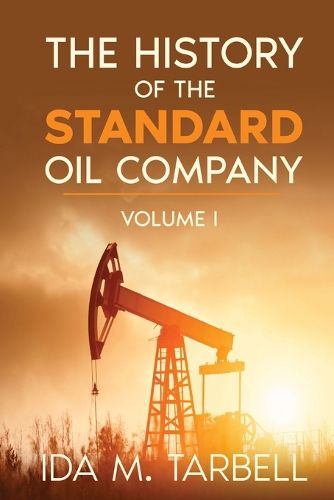Readings Newsletter
Become a Readings Member to make your shopping experience even easier.
Sign in or sign up for free!
You’re not far away from qualifying for FREE standard shipping within Australia
You’ve qualified for FREE standard shipping within Australia
The cart is loading…






This title is printed to order. This book may have been self-published. If so, we cannot guarantee the quality of the content. In the main most books will have gone through the editing process however some may not. We therefore suggest that you be aware of this before ordering this book. If in doubt check either the author or publisher’s details as we are unable to accept any returns unless they are faulty. Please contact us if you have any questions.
Journalist Ida Tarbell wrote her expose of the monopolistic practices of John D. Rockefeller’s Standard Oil Company as a serialized work in McClure’s Magazine before the appearance of the first book edition of 1904. The breakup of Standard Oil in 1911 into thirty-four baby Standards can be attributed in large part to Tarbell’s masterly investigative reporting, often labeled as muckraking. Ida Tarbell’s childhood experiences were the inspiration behind the book. Her father, Franklin Tarbell, worked for Standard Oil and lived through what Ida called hate, suspicion, and fear that engulfed the community.
As a direct witness to the schemes and horizontal integration of John D. Rockefeller and his associates, Tarbell began building the foundations of The History of the Standard Oil Company early with growing senses of interest and discontent. After taking a job at McClure’s Magazine, Tarbell uncovered a key piece of evidence proving that Standard Oil was rigging railroad prices and preying on its competition. Public outcry erupted at the conclusion of Tarbell’s 19-part expose of Standard Oil published in McClure’s, eventually resulting in the expedited breakup of Standard Oil in 1911.
These reactions are immortalized in political cartoons utilizing imagery of Rockefeller’s hidden agendas being demolished by investigative journalism and muckraking. Several journal and newspaper reviewers addressed The History of Standard Oil Company by praising its calmness in the face of hatred, focus on facts, and genuine exposure of the effects that greed can have on businessmen seeking success.
A 1904 editorial review from The New York Times relayed the highlights of the volumes to the public, noting the diplomatic tendencies of Tarbell within her work - still widely respectful of the achievements of John D. Rockefeller but critical of Standard Oil’s business strategies that were unfair and of questionable legality.
Though Standard Oil Company accrued more cumulative value after it was broken up, the exposure of what Tarbell described as immoral and illegal business became a striking symbol of the power of the press. As such, The History of Standard Oil Company harbors great significance as a standard-bearer of modern investigative journalism.
$9.00 standard shipping within Australia
FREE standard shipping within Australia for orders over $100.00
Express & International shipping calculated at checkout
This title is printed to order. This book may have been self-published. If so, we cannot guarantee the quality of the content. In the main most books will have gone through the editing process however some may not. We therefore suggest that you be aware of this before ordering this book. If in doubt check either the author or publisher’s details as we are unable to accept any returns unless they are faulty. Please contact us if you have any questions.
Journalist Ida Tarbell wrote her expose of the monopolistic practices of John D. Rockefeller’s Standard Oil Company as a serialized work in McClure’s Magazine before the appearance of the first book edition of 1904. The breakup of Standard Oil in 1911 into thirty-four baby Standards can be attributed in large part to Tarbell’s masterly investigative reporting, often labeled as muckraking. Ida Tarbell’s childhood experiences were the inspiration behind the book. Her father, Franklin Tarbell, worked for Standard Oil and lived through what Ida called hate, suspicion, and fear that engulfed the community.
As a direct witness to the schemes and horizontal integration of John D. Rockefeller and his associates, Tarbell began building the foundations of The History of the Standard Oil Company early with growing senses of interest and discontent. After taking a job at McClure’s Magazine, Tarbell uncovered a key piece of evidence proving that Standard Oil was rigging railroad prices and preying on its competition. Public outcry erupted at the conclusion of Tarbell’s 19-part expose of Standard Oil published in McClure’s, eventually resulting in the expedited breakup of Standard Oil in 1911.
These reactions are immortalized in political cartoons utilizing imagery of Rockefeller’s hidden agendas being demolished by investigative journalism and muckraking. Several journal and newspaper reviewers addressed The History of Standard Oil Company by praising its calmness in the face of hatred, focus on facts, and genuine exposure of the effects that greed can have on businessmen seeking success.
A 1904 editorial review from The New York Times relayed the highlights of the volumes to the public, noting the diplomatic tendencies of Tarbell within her work - still widely respectful of the achievements of John D. Rockefeller but critical of Standard Oil’s business strategies that were unfair and of questionable legality.
Though Standard Oil Company accrued more cumulative value after it was broken up, the exposure of what Tarbell described as immoral and illegal business became a striking symbol of the power of the press. As such, The History of Standard Oil Company harbors great significance as a standard-bearer of modern investigative journalism.